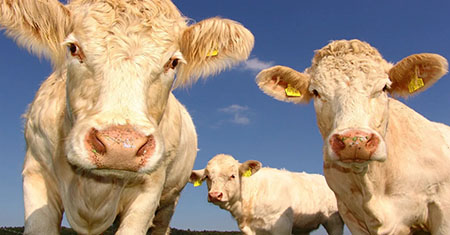CELEBRATING 25 YEARS OF EXCELLENCE: Top stories of 2023, January 2, 2024
Thank you for your support for WorldTribune, Window on the Real World. Have a great 2024! — The Editors
by WorldTribune Staff, January 13, 2023
The mRNA vaccines may at some point be injected into livestock and companion animals, Dr. Robert Malone contends.
 Bayer and BioNTech “have been working on livestock and companion animal mRNA vaccines for over six years,” Malone noted in a Jan. 11 substack.com analysis. “Logic predicts that they will soon have livestock and companion mRNA vaccine and RNA therapeutics on the market.”
Bayer and BioNTech “have been working on livestock and companion animal mRNA vaccines for over six years,” Malone noted in a Jan. 11 substack.com analysis. “Logic predicts that they will soon have livestock and companion mRNA vaccine and RNA therapeutics on the market.”
Malone cited three therapy platforms that BioNTech has been building through mRNA technologies to be used in livestock and companion animals:
• Infectious disease vaccines
• Cancer immunotherapies
• Protein replacement
Sometime before 2015, the USDA issued a conditional license for a mRNA vaccine for use in pigs for Porcine Epidemic Diarrhea Virus (PEDv).
When asked if the government would mark packages as “vaccinated meat,” Malone said: “I wouldn’t count on it. In fact, I bet – no.”
In response to a Twitter user, who stated that this needed to be stopped “ASAP,” Malone said: “We have to build alternate systems. I don’t think we can stop them, but we can choose not to buy their food, take their drugs or mRNA vaccines. We can choose to not use their ‘health care providers.’ We can be our own – independent people outside of their hellscape.”
Malone noted: “Basically something akin to an emergency use authorization was issued around 2014 or 2015. Just like with the mRNA COVID-19 vaccine, full licensure was not granted but the conditional license remains in place. Is this a strategy to circumvent the USDA vaccine licensing and/or authorization process?”
Malone notes that ClinicalTrials.gov “makes searching for human clinical trials easy. For instance, a quick search reveals that there are over 50 clinical trials for mRNA vaccines in progress and over 200 registered.
“With animals, there is no such database. mRNA vaccines in the ‘animal health’ or veterinary markets are difficult to track until the company or the USDA is ready to release information on that product’s development or release. The USDA and/or the NIH have no mechanism for tracking potential new vaccines, drugs or biologics for the animal market.”
